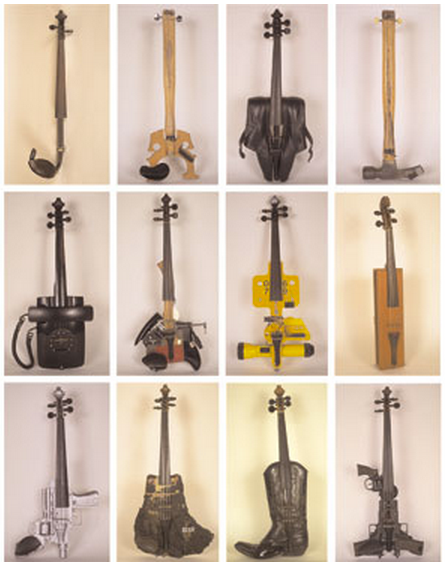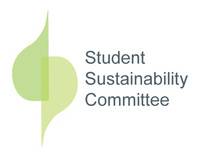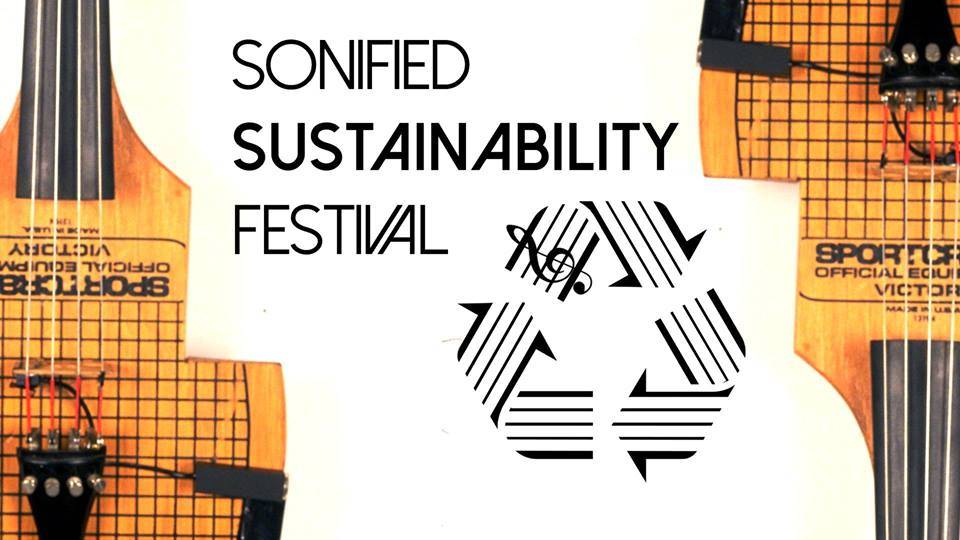The Sonified Sustainability Festival, which kicks off next Thursday, highlights the relationship between the arts and sustainability.
The festival has two main components. Beginning on Thursday, April 14th, the Illini Union Art Gallery will display work by Brooklyn-based artist Ken Butler. Butler has been performing since 1978 on musical instruments made from found items, including tennis rackets, mannequin arms, golf clubs, umbrellas, discarded metal, and more. Butler’s creations are both functional musical instruments and also sculptures made from urban debris.
 Then, on Saturday, April 16th, the Krannert Center for the Performing Arts will host musicians who perform on instruments made from found materials, including Butler himself. Local performing artists and groups Berimbau Bandit, Caxixikid, and Tom Taylor will share their musical creations, and students from Dr. Preston L. Williams, Jr. Elementary School will showcase recycled instruments they have created. An information fair featuring organizations such as the Prairie Rivers Network, Students for Environmental Concerns, and the I.D.E.A. Store will take place alongside the performances.
Then, on Saturday, April 16th, the Krannert Center for the Performing Arts will host musicians who perform on instruments made from found materials, including Butler himself. Local performing artists and groups Berimbau Bandit, Caxixikid, and Tom Taylor will share their musical creations, and students from Dr. Preston L. Williams, Jr. Elementary School will showcase recycled instruments they have created. An information fair featuring organizations such as the Prairie Rivers Network, Students for Environmental Concerns, and the I.D.E.A. Store will take place alongside the performances.
Jason Finkelman, the festival’s organizer, said that he has been thinking for a while about how to showcase the relationship between sustainability and the arts.
“I thought about Ken Butler’s work immediately,” he said, “since Butler was one of the first artists working in the medium of found materials whose work received attention.”
Finkelman described Butler’s music as “very accessible” and a “mixture of many different musical styles, including jazz, funk, and rock, but also international influences.”
“Butler is well known on the East Coast,” said Finkelman, “But I don’t know when he was last in the Midwest. So we are honored to have him perform here in town.”
Finkelman said he hopes the festival will help people become more aware of their sound environments, including the pervasiveness of manmade objects in our world.
“Listening a key factor in getting people to be more aware of their sound environments,” said Finkelman. “Listening deeply is an art that we have to practice to become good at. People aren’t necessarily very aware of the sounds that they hear. But the more you become aware of your sound environment, the more you notice what we’ve built, what we use, and what we don’t use in our day to day lives. There aren’t quiet places where you don’t hear things that aren’t manmade anymore.”
Fikelman said he hopes the artists showcased at Sonified Sustainability will provide good examples of how to creatively address the overproduction of manmade items.
“A lot of things just end up in the trash,” he pointed out. “We want to bring attention to how we can reuse materials and, in doing so, make art.”
 A major sponsor of the Sonified Sustainability Festival is the Student Sustainability Committee, which oversees the fund of dedicated student fees that support sustainability on the U of I’s campus. Micah Kenfield, a staff advisor for the Student Sustainability Committee, said their organization was impressed by the Festival’s uniqueness when they Finkelman’s proposal.
A major sponsor of the Sonified Sustainability Festival is the Student Sustainability Committee, which oversees the fund of dedicated student fees that support sustainability on the U of I’s campus. Micah Kenfield, a staff advisor for the Student Sustainability Committee, said their organization was impressed by the Festival’s uniqueness when they Finkelman’s proposal.
“A lot of the proposals we receive are important but look kind of familiar, like programs on LED lighting, solar energy, or waste reduction. We had never seen a music festival proposal before. And when we went through the proposal, we realized it addressed a missed opportunity in sustainability — an aspect of sustainability that has been neglected.”
Kenfield said that while the field of sustainability is good at talking about numbers, it has engaged less with the arts.
“The field of sustainability is good at speaking the language of STEM majors: this is how many watts we saved, or this is how many pounds of trash were averted. But we often leave out the liberal and performing arts. We need more visual and auditory messages about how to improve our planet—messages that are based on more than numbers. We see this festival as part of changing the conversation in the field of sustainability.”
Finkelman said he hopes Sonified Sustainability will become an annual event. In the future, he hopes to include sound walks in the festival.
“I see this festival as a way to broaden our idea of what sound is,” said Finkelman, “and, in the process, change how we understand ecology.”
Sonified Sustainability’s performances and information fair — which are family-friendly — take place on April 16th from 1–5 p.m. in the Krannert Center for the Performing Arts. Ken Butler’s musical sculptures will be on display in the Illini Union Art Gallery from April 14 through May 1. For more information about the festival, check out the event’s Facebook page.








